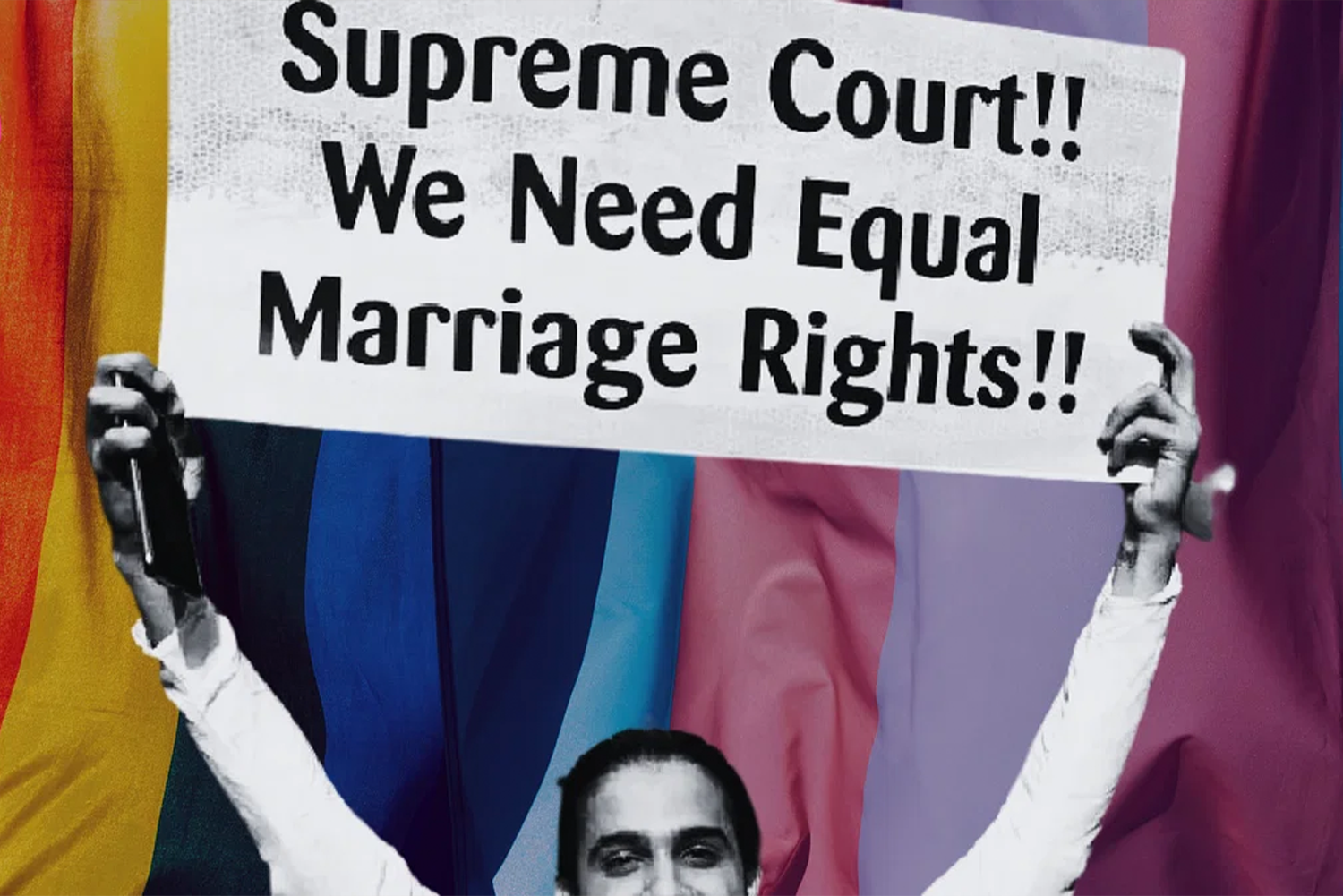On May 11, 2023, a historic moment unfolded within the hallowed halls of the Indian judiciary. The Supreme Court of India began hearing arguments on the legality of same-sex marriage, a topic that has long been a subject of contention and debate.
This landmark case has the potential to reshape the social and legal landscape of the country, and its outcome will reverberate far beyond the courtroom.
Let us delve into the details of this crucial hearing and its implications for LGBTQ+ rights in India.
The hearing came as a result of a petition filed by a group of LGBTQ+ activists challenging the constitutional validity of Section 377 of the Indian Penal Code, which criminalized same-sex relationships until it was decriminalized in 2018.
The petitioners argue that the denial of marriage rights to same-sex couples violates the fundamental rights enshrined in the Indian Constitution, including the right to equality, freedom, and privacy.
The Courtroom
As the hearing commenced, all eyes turned to the distinguished bench comprising the Chief Justice and Justice D.Y. Chandrachud, known for his progressive views on social issues. The courtroom buzzed with anticipation as the arguments began, with advocates on both sides presenting their cases.
The petitioners' counsel passionately argued that denying same-sex couples the right to marry perpetuates discrimination and violates their fundamental rights.
On the other side, the government's counsel expressed concerns regarding the social, cultural, and religious aspects of recognizing same-sex marriage.
During the hearing, Chief Justice Chandrachud made several impactful statements that shed light on the complex issues surrounding same-sex marriage.
His statements reflected a deep understanding of the challenges faced by the LGBTQ+ community and emphasized the need for equality and inclusivity.
One notable quote from Chief Justice Chandrachud highlighted the significance of recognizing same-sex relationships beyond physicality:
"These are not just physical relations. They are also emotional relationships. Why can't we see that? Why are we blind to it?"
This statement reflects a broader understanding of relationships, acknowledging that emotional and psychological bonds are integral components of human connections.
Furthermore, Chief Justice Chandrachud emphasized the importance of constitutional rights and equality, stating,
"The Constitution is not gender-blind; it is gender-sensitive. The Constitution protects the rights of individuals regardless of their sexual orientation."
This perspective underscores the principle of inclusivity and reinforces the fundamental rights guaranteed to all citizens, irrespective of their sexual orientation.
Menaka Guruswamy, one of the prominent lawyers representing the petitioners, also made a powerful statement about the importance of same-sex marriage. She emphasized that
it is not just a legal battle but a fight for love and equality.
Guruswamy's passionate words resonated with the core essence of the case, highlighting the significance of recognizing same-sex relationships on a deeply personal level.
What are the impact and Implications?
The significance of this hearing cannot be overstated. If the Supreme Court rules in favor of same-sex marriage, it would mark a historic moment for LGBTQ+ rights in India.
It would be a step towards dismantling the barriers that LGBTQ+ individuals face in their pursuit of happiness and equality.
Recognizing same-sex marriage would provide legal protection, social recognition, and the numerous rights and benefits that come with marriage, such as inheritance rights, healthcare access, and child custody.
Chief Justice Chandrachud’s statements during the hearing are indicative of a progressive mindset within the judiciary, which acknowledges the holistic nature of same-sex relationships.
And Menaka Guruswamy's powerful statement serves as a reminder that this case transcends legal technicalities.
It is about the lives and experiences of LGBTQ+ individuals who deserve the same rights and opportunities as their heterosexual counterparts.
By recognizing same-sex marriage, the Supreme Court would send a message of affirmation and inclusion, affirming that love knows no gender and that all individuals, regardless of their sexual orientation, deserve equal treatment under the law.
Conclusion
The Supreme Court's reserved verdict on the legal status of same-sex marriage marks a significant moment in the ongoing fight for LGBTQ+ rights in India.
The culmination of the hearings, which included passionate arguments from both sides, showcases the complexities and diverse perspectives surrounding this issue.
The Supreme Court's decision on same-sex marriage will not only shape the legal landscape but also reflect the country's commitment to equality and inclusivity. It has the potential to dismantle discriminatory barriers and provide same-sex couples with the legal recognition and protections that come with marriage.
The reserved verdict on same-sex marriage demonstrates that India is actively grappling with issues of LGBTQ+ rights and acknowledging the importance of constitutional equality.
Regardless of the outcome, the fight for LGBTQ+ rights will continue. Activists and individuals who have tirelessly advocated for equal rights will persevere in their efforts to create a society that embraces diversity and ensures the full inclusion of all its citizens.
The Supreme Court's reserved verdict signals a critical juncture in the journey toward equality for the LGBTQ+ community in India. It serves as a
reminder that progress takes time, and the struggle for equal rights is an ongoing process. The collective hope is that the Court's decision will reflect the principles of justice, fairness, and inclusivity, and pave the way for a more inclusive and accepting India.
At Sassiest, we stand in solidarity with the queer community and reaffirm our unwavering support for LGBTQ+ rights. We recognize the importance of equality, inclusivity, and respect for all individuals, regardless of their sexual orientation or gender identity.
To our LGBTQ+ readers and community members, we see you, we hear you, and we stand beside you in the ongoing fight for justice and equality.
We believe in a world where everyone can love, express themselves, and live authentically without fear of discrimination or prejudice.
We will remain committed to providing a platform that celebrates diversity, amplifies marginalized voices, and promotes understanding and acceptance.
Together, let us continue to advocate for a society where every person is valued, respected, and afforded the same rights and opportunities, regardless of their sexual orientation or gender identity. Through collective efforts, we can build a more inclusive and equitable future for all.





